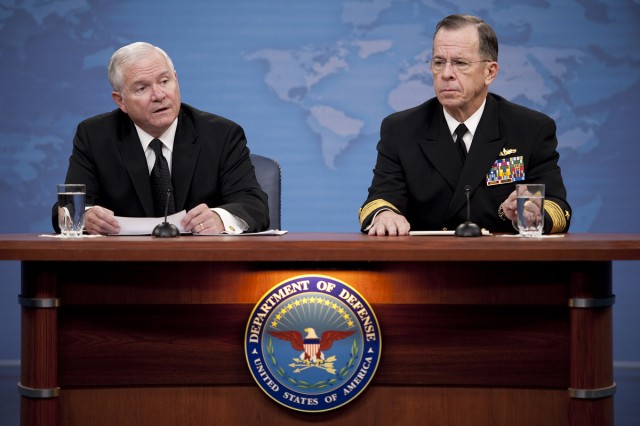WASHINGTON, Nov. 30, 2010 -- Defense Secretary Robert M. Gates today urged the Senate to repeal the so-called "Don't Ask, Don't Tell" law this year.
Gates and Navy Adm. Mike Mullen, chairman of the Joint Chiefs of Staff, spoke at a Pentagon news conference unveiling the recommendations of the working group tasked with looking at the issues associated with implementing a repeal of the law that bans gays from serving openly in the military.
Gates said any change causes short-term disruptions, but that the military can handle longer-term impacts. He added that he's recommending repeal of the law after fully studying the potential impact on military readiness, including the impact on unit cohesion, recruiting and retention, and other issues critical to the performance of the force.
"In my view, getting this category right is the most important thing we must do," Gates said. "The U.S. armed forces are in the middle of two major military overseas campaigns - a complex and difficult drawdown in Iraq, a war in Afghanistan - both of which are putting extraordinary stress on those serving on the ground and their families. It is the well-being of these brave young Americans, those doing the fighting and the dying since 9/11, that has guided every decision I have made in the Pentagon since taking this post nearly four years ago. It will be no different on this issue."
"I am determined to see that if the law is repealed," he continued, "the changes are implemented in such a way as to minimize any negative impact on the morale, cohesion and effectiveness of combat units that are deployed, or about to deploy to the front lines."
Gates acknowledged concerns from troops in combat units raised in a survey on the potential impact changing the law, but added that he believes they can be overcome if a repeal is handled properly.
"In my view, the concerns of combat troops as expressed in the survey do not present an insurmountable barrier to successful repeal of 'Don't Ask, Don't Tell,'" the secretary said. "This can be done and should be done without posing a serious risk to military readiness. However, these findings do lead me to conclude that an abundance of care and preparation is required if we are to avoid a disruptive and potentially dangerous impact on the performance of those serving at the tip of the spear in America's wars."
The working group, co-chaired by Army Gen. Carter F. Ham, commander of U.S. Army Europe, and Defense Department General Counsel Jeh C. Johnson, took nearly 10 months to research and analyze data in drawing its conclusions. The mission was to determine how best to prepare for such a change should the Congress change the law.
Gates said he wanted the group to engage servicemembers and their families on the issue, not to give servicemembers a vote, but to get an idea how best to implement the changes.
"I believe that we had to learn the attitudes, obstacles and concerns that would need to be addressed should the law be changed," he said. "We could do this only by reaching out and listening to our men and women in uniform and their families."
The survey results found more than two-thirds of the force do not object to gays and lesbians serving openly in uniform, Gates said.
"The findings suggest that for large segments of the military, repeal of 'Don't Ask, Don't Tell,' though potentially disruptive in the short term, would not be the wrenching, traumatic change that many have feared and predicted," the secretary said.
But the data also show that servicemembers in combat arms specialties - mostly in the Army and Marine Corps, but also in the special operations from the Navy and Air Force - have a higher level of discomfort and resistance to changing the current policy, Gates said.
"Those findings and the potential implications for America's fighting forces remain a source of concern to the service chiefs and to me," he said.
The working group also examined thoroughly all the potential changes to the department's regulations and policies dealing with matters such as benefits, housing, relationships within the ranks, separations and discharges. The report says that the majority of concerns often raised in association with the repeal - dealing with sexual conduct, fraternization, billeting arrangements, marital or survivor benefits - could be governed by existing laws and regulations.
"Existing policies can and should be applied equally to homosexuals as well as heterosexuals," Gates said. "While a repeal would require some changes to regulations, the key to success, as with most things military, is training, education, and, above all, strong and principled leadership up and down the chain of command."
The secretary called on the Senate to pass legislation the House of Representatives passed earlier this year, which calls for the president, defense secretary and chairman of the Joint Chiefs of Staff to certify that the military can handle repeal without a lessening of combat effectiveness before a repeal takes effect.
"What is needed is a process that allows for a well-prepared and well-considered implementation - above all, a process that carries the imprimatur of the elected representatives of the people of the United States," he said. "Given the present circumstances, those that choose not to act legislatively are rolling the dice that this policy will not be abruptly overturned by the courts."
The working group's plan, with a strong emphasis on education, training and leader development, provides a solid road map for a successful full implementation of repeal, assuming that the military is given sufficient time and preparation to get the job done right, the secretary said.
Related Links:
Government files emergency appeal on 'Don't Ask' injunction
SecDef changes discharge authority for 'Don't Ask' law
Gates sets Nov. 30 for 'Don't Ask, Don't Tell' report release
Leaders can pave way for openly gay troops, general says
DoD Don't Ask, Don't Tell Information Portal


Social Sharing